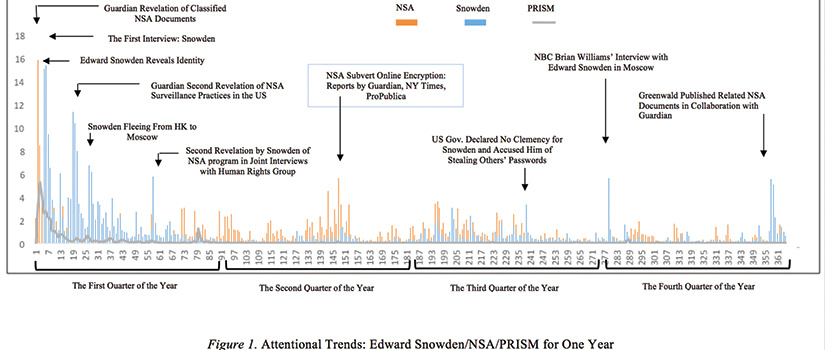Posted June 2, 2016
Story by Trey Williams, Reprinted from InterCom
Above: The daily volume of tweets that mention Snowden, PRISM, NSA for the one year
(2013 June - 2014 June)
As social media continues to grow, the study and research in the field of social media
increases. Using social media or "big data," Dr. S. Mo Jang (Big Mo), tries to determine
how it can be used to reflect public opinion on controversial issues such as gay rights
and climate change.
Big Mo, an assistant professor in the School of Journalism and Mass Communications
at the University of South Carolina, got his nickname from combining his first name
and the "big data" in his Twitter research. While Facebook is arguably the most popular
social media site "Facebook data is private and owned by Facebook. Twitter data is
public," said Dr. Jang.
He collects Twitter data by using different frames. Frames are specific phrases or
aspects of a topic. For the gay rights study, Dr. Jang uses the "rights or equality"
frame and the "religion" frame. Looking at the data state by state, he attempts to
determine public opinion to see if any predictions of political change may be made.
He found that if one state "talks" more about the rights or equality of gay marriage,
that state may be more supportive of gay rights and political change may be in that
state’s future.
During his research, he found that Hawaii "talked" more about the rights or equality
frame than the religion frame. Using the theory above, Dr. Jang predicted that Hawaii
could be close to a policy change and six months later gay marriage was legalized.
On climate change, Dr. Jang found that the United States is divided on the issue.
"Red states talk about the ‘hoax’ frame, whether climate change is a lie or not, while
blue states are more focused on how we can deal with it," he said.
While traditional data mostly focused on cause and effect, social media data is starting
to change that and focus on correlation. Dr. Jang believes that this new big data
research is important because "Real time data can make a unique contribution to the
scholarship by showing different findings than traditional research methods, or confirming
that of previous research."
Traditional methods, such as issuing surveys, depend on the willingness of people
to fill out a survey. People may not want to fill a survey our or if they do complete
it, the data is not always dependable because the person could have lied. The advantage
of using Twitter data is that "people voluntarily post things and express opinions;
they are not answering a surveyor’s questions," said Jang.
